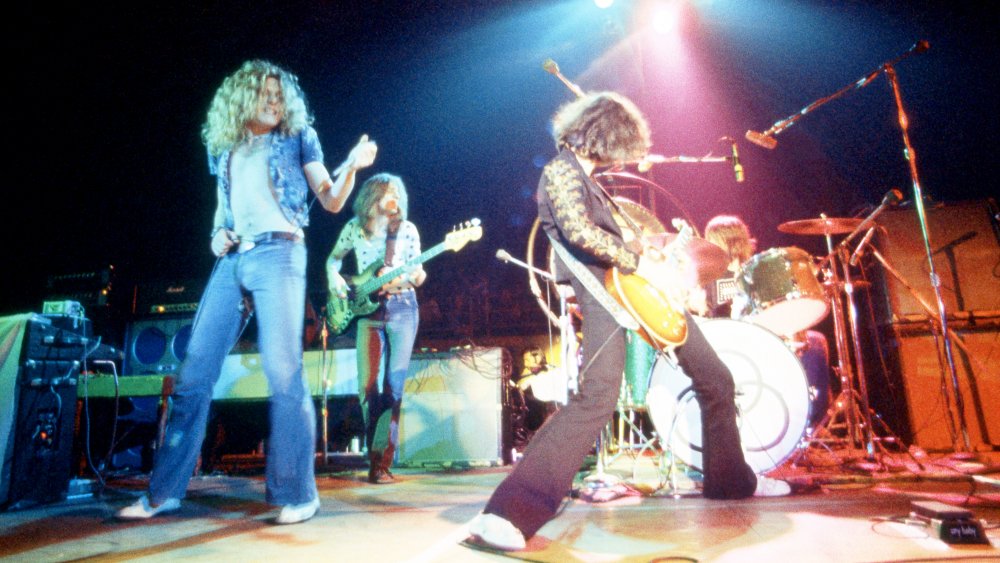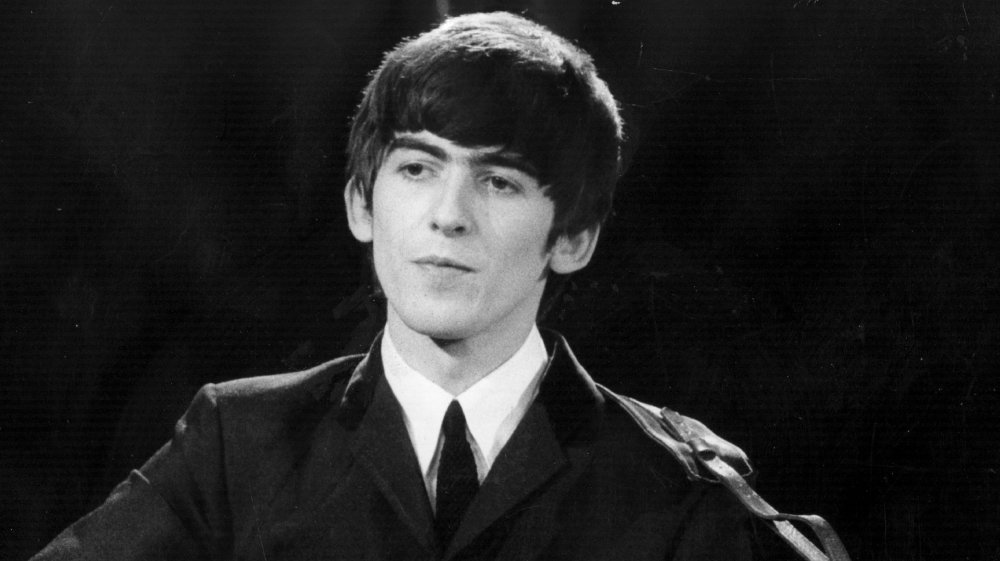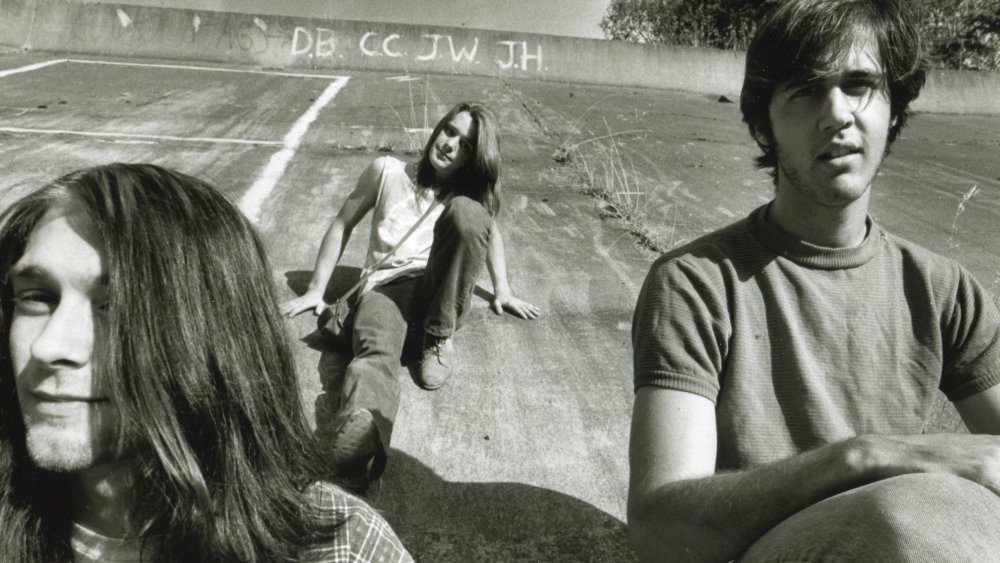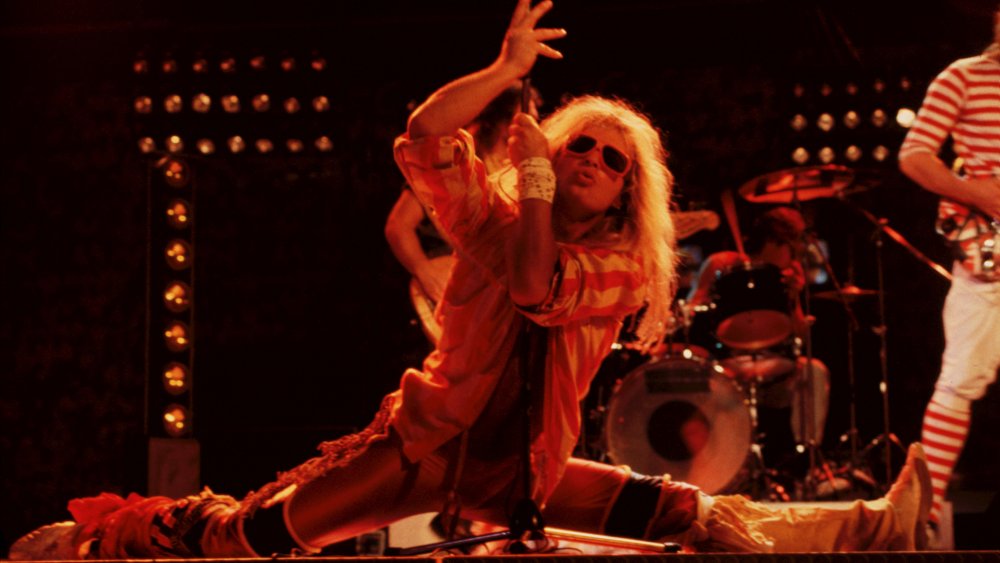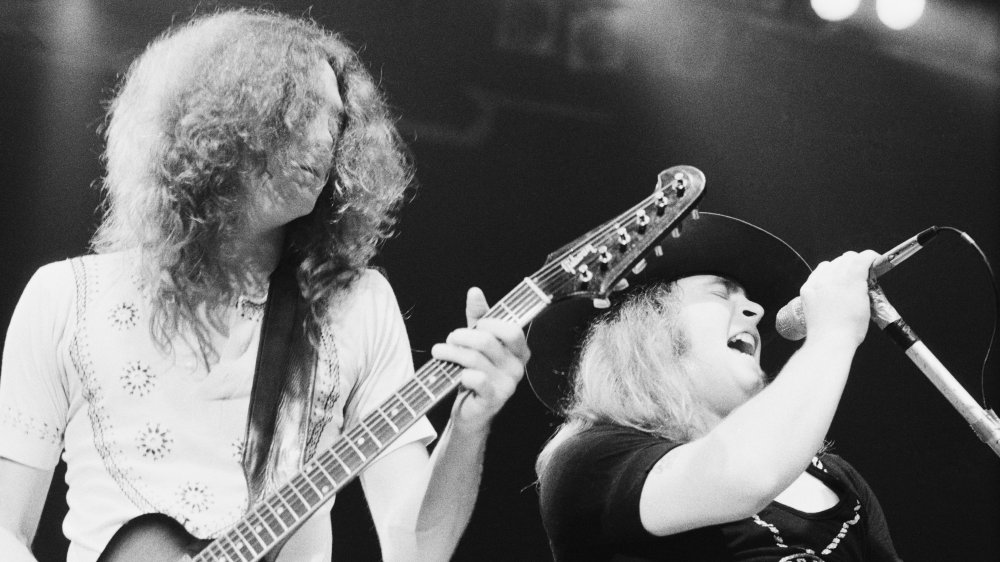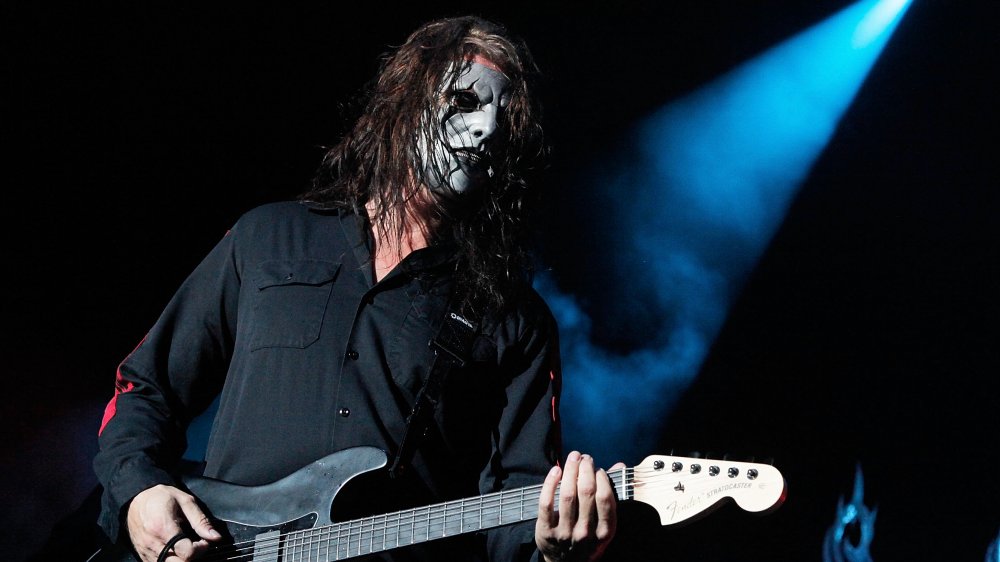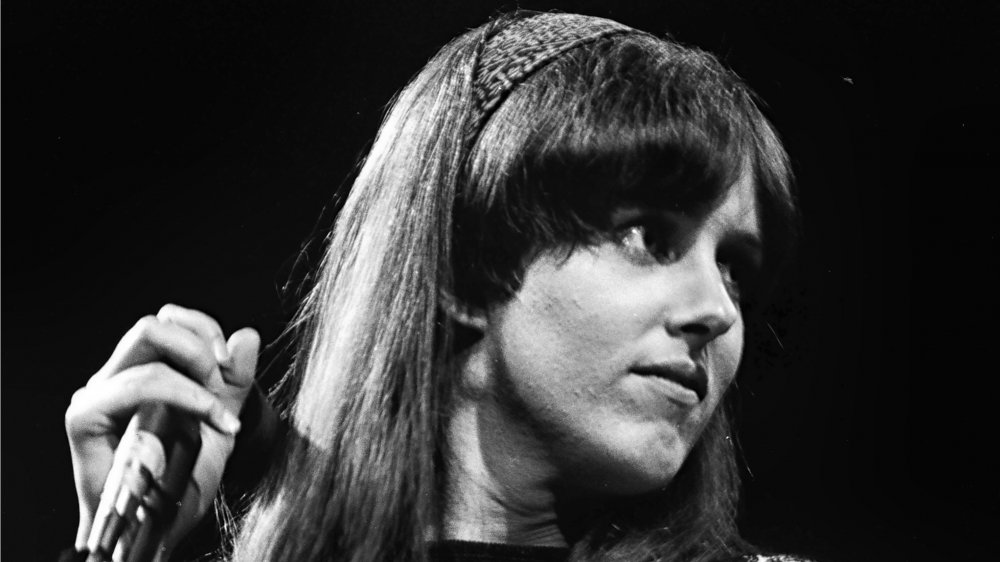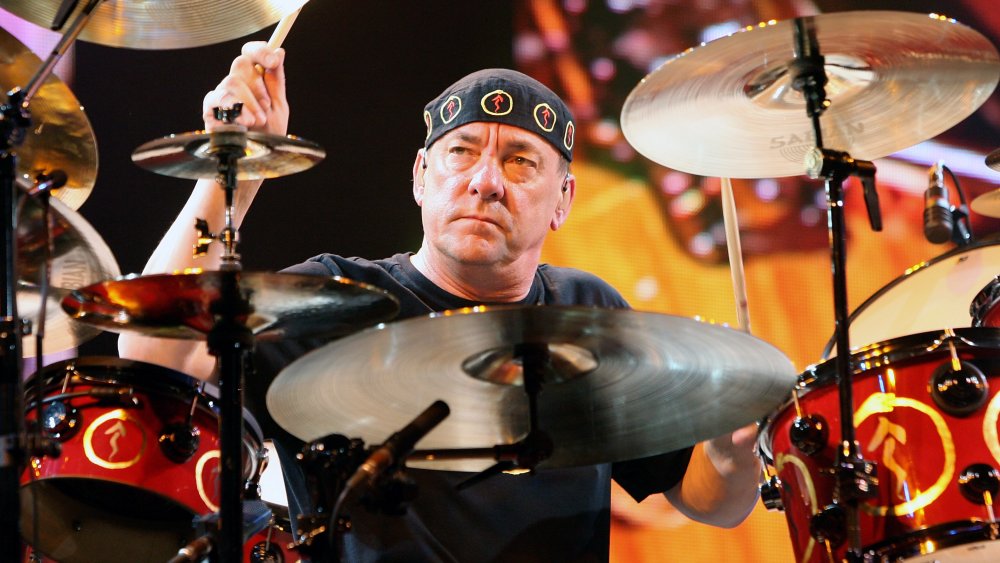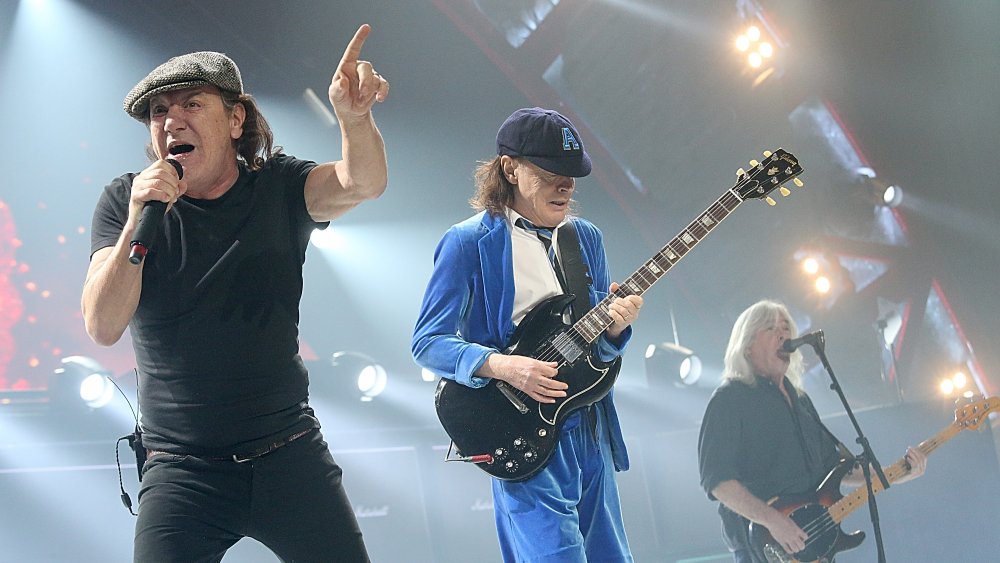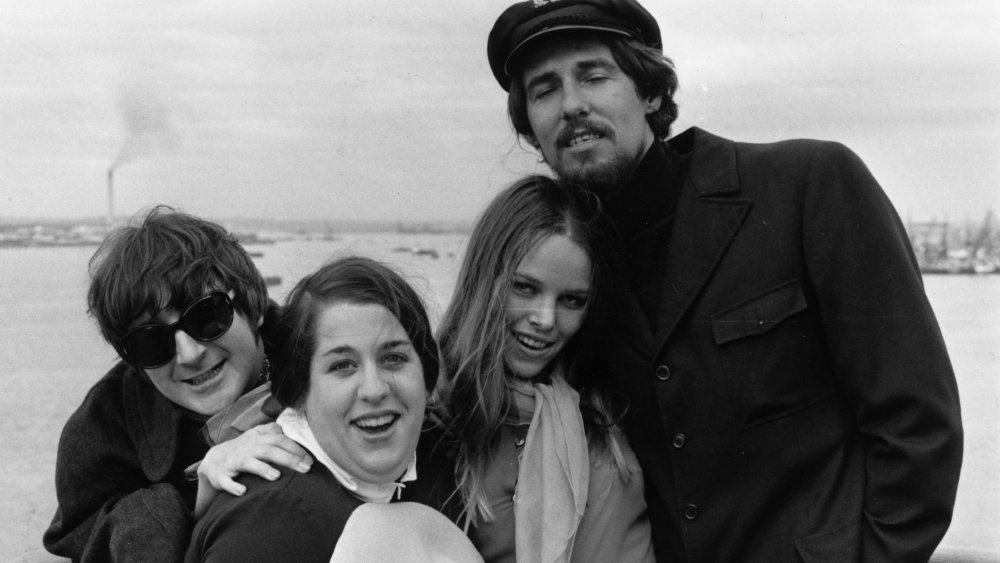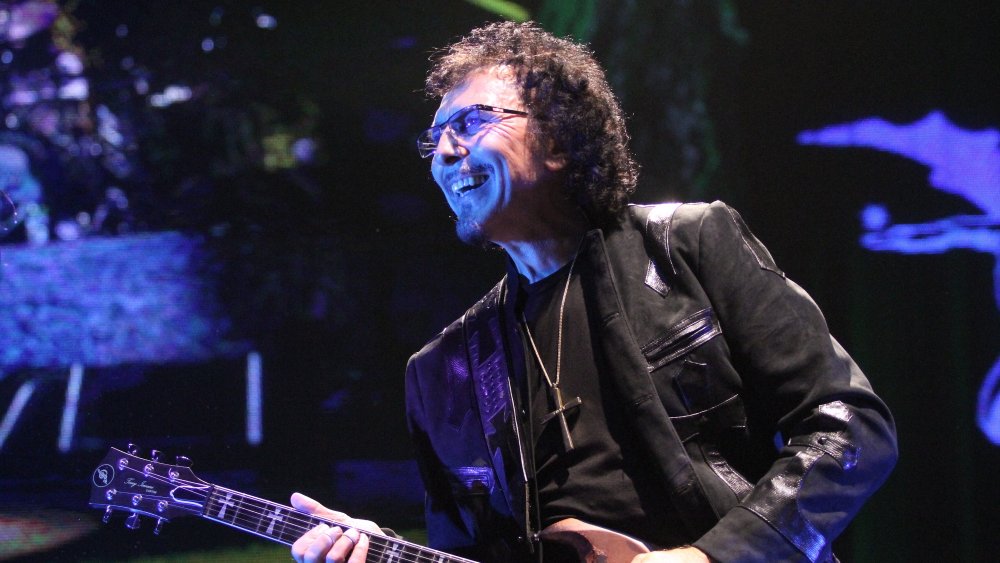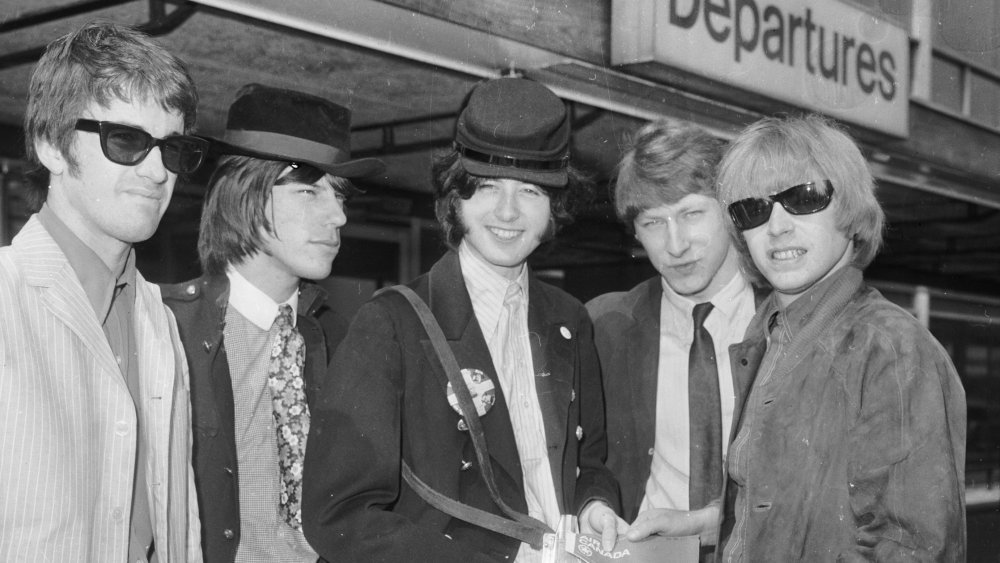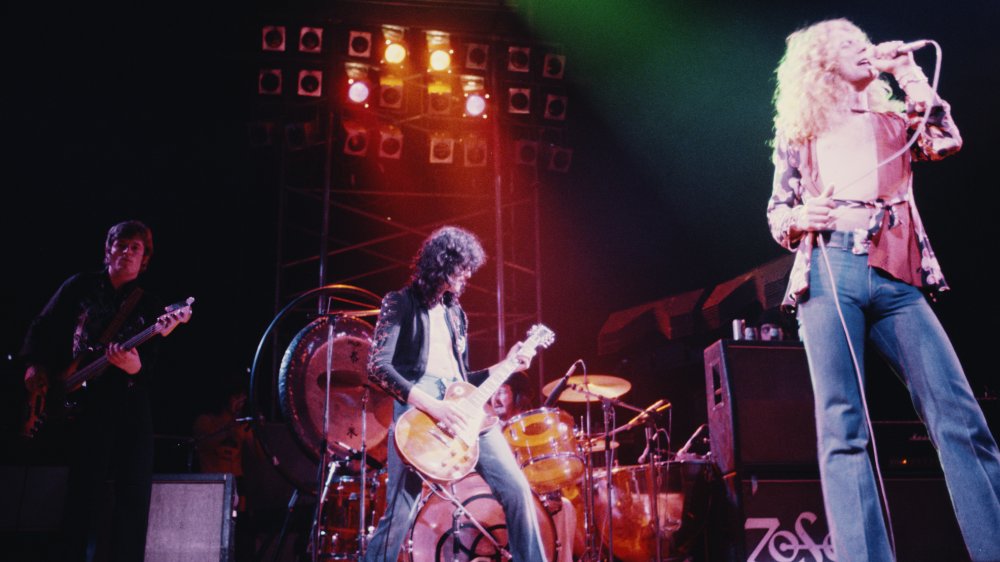Rock Stars Who Almost Weren't In The Bands That Made Them Famous
Stardom. Every artist dreams of it, but a precious few make it to the lofty heights of fame. Fewer still can make it last. Success in any field can be a struggle, but the music business is notoriously difficult. Even for the dedicated, there are no guarantees, and any veteran rocker will tell you that the overnight sensation is a myth. As hard rock legends AC/DC tell us, "It's a long way to the top if you want to rock 'n' roll." It has also been said that "opportunity knocks but once," but in the world of music, second chances, underdogs, and unlikely stories are not merely the fuel for dreams — they're often the reality that makes icons. Just as often, potential rock stars self-sabotage, leave, or get kicked out of their bands just before lightning strikes.
The following stories are about the lucky ones — the rockers whose persistence, talent, or simple good fortune helped them beat the odds. From the golden age of rock 'n' roll to the heyday of grunge and nu metal, these are the legendary artists who hit the big time by the skin of their teeth. These are the rock stars who almost weren't in the bands that made them famous.
George Harrison was too young for the Beatles
The names John, Paul, George, and Ringo are eternally linked as the Beatles, the biggest and most iconic band in music history. Aside from their stellar musicianship and songwriting, part of the mystique of the band was each member's distinct identity: cute Paul, leader John, witty Ringo, and quiet George. However, had a young John Lennon gone with his first instinct, George Harrison, the band's soulful center and a prime ingredient in their unique sound, would have been left out of the Beatles' incredible musical journey.
As recounted by Ultimate Classic Rock, Lennon thought Harrison was too young to be in the band that would become the Beatles. In early 1958, Lennon and Paul McCartney were looking to expand the sound of their group, the Quarry Men, with another guitarist. McCartney suggested his schoolmate, 14-year-old George Harrison. Despite a flawless impromptu performance of the Bill Justis R&B hit "Raunchy," Lennon initially balked, saying that the youthful guitarist looked even younger than baby-faced McCartney. In an archival interview featured in the 1995 documentary film The Beatles Anthology, Lennon states that it was Harrison's musical skills that finally won him over. "We asked George to join because he knew more chords," remembered Lennon. With Harrison onboard, the essential elements of the Beatles were in place. Just four years later, the band from Liverpool would release their first single "Love Me Do," sparking the worldwide phenomenon of Beatlemania.
A rival band nearly stole Nirvana's Krist Novoselic
Nirvana bassist Krist Novoselic has remained mostly absent from the music scene following bandleader Kurt Cobain's 1994 death. Nevertheless, he was an integral part of the iconic grunge act from its inception through three groundbreaking albums. Things might have turned out much differently had tensions between Cobain and Novoselic and an offer from an established Seattle band lured the bassist away from Nirvana.
In an excerpt from his memoir Sing Backwards and Weep, featured in GQ Magazine, Screaming Trees vocalist Mark Lanegan recalls how he nearly poached Novoselic for his own band. Lanegan, who had just lost his bassist Van Conner, was invited to see a gig featuring an unknown band whose singer was a big fan of Screaming Trees. The band was Nirvana, and the singer was Kurt Cobain. Before Nirvana played a note, Lanegan was already taken with 6'7" Novoselic's imposing frame and attitude. Lanegan writes, "Upon seeing this enormous guy tuning up, my first thought was here's my bass player. ... I began to formulate a plan to steal him away from this band I'd not even heard yet."
A few weeks after the performance, Lanegan received a phone call from Novoselic, inquiring if Screaming Trees still needed a bass player. Nirvana's bassman was reaching his limit with Cobain's grip on the band. Blown away by Nirvana's fully formed vision, however, Lanegan encouraged Novoselic to stick with Cobain. He knew he'd witnessed history.
David Lee Roth had the gear but not much else
Rock fans may argue which incarnation of the band was best, but everyone agrees that Van Halen's classic lineup will forever be remembered for two things: the blazing, fretboard acrobatics of guitarist extraordinaire Edward Van Halen and its flamboyant, motormouth frontman David Lee Roth. Famous for his unrelenting charisma, lean, spandex-clad form, and high-flying stage moves, Roth's many talents actually had little to do with his inclusion in the band.
According to a recap of Van Halen's decades-long feud with Roth featured in the Herald-Whig, the singer unsuccessfully auditioned for the band, then known as Mammoth, several times between 1972 and 1974 before landing the gig. Mammoth, packed with talent but low on gear, would often rent Roth's PA system for the sum of $50 per show. Eddie Van Halen, eager to leave singing behind to concentrate on the guitar, at last relented, saving both his voice and the rental fee. At Roth's suggestion, the brothers dropped the Mammoth moniker and adopted their surname for the band.
In 1978, Van Halen would make the transition from the Los Angeles club scene to arenas with their debut album Van Halen. The original lineup of Roth, Eddie and Alex Van Halen, and bassist Michael Anthony would last until internal tensions led to the singer's ouster and replacement with Sammy Hagar in 1985. Roth returned to Van Halen in 2007.
Lynyrd Skynyrd had Allen Collins up a tree
Lynyrd Skynyrd's Ronnie Van Zant and Bob Burns nearly missed out on recruiting guitarist Allen Collins thanks to their notorious bad-boy reputations. When approached about joining their band by the future frontman and drummer, Collins, who would go on to co-write many of Skynyrd's biggest hits, including "Freebird," "Gimme Three Steps," and "That Smell," was so certain that the pair were spoiling for a fight that he beat a hasty retreat on his bicycle. Citing an interview with guitarists Rickey Medlocke and Gary Rossington conducted by CMT, the music website Society of Rock recounts the hilarious events that brought Collins into the band. Rossington recalls, "Allen was riding his bike and Ronnie and Bob yelled, 'Hey, Allen! Come here, we wanna talk to you!' and all of a sudden Allen hauled butt because he thought Ronnie was gonna beat him up!" Luckily for generations of Southern rock fans, they were able to quickly locate their future guitar-slinger in some nearby woods — frightened out of his wits up a tree.
Relating the same story in the book Growing Up Country, Rossington adds, "It took a while to convince him we just wanted to talk to him about being in our band. Finally, he came down from the tree, and we headed to his house to pick up his guitar and amp. And that's how Lynyrd Skynyrd started."
Jim Root turned down Slipknot ... twice
Slipknot found that patience pays when they recruited six-string virtuoso Jim Root just prior to recording their 1999 debut album. In a business where inflated egos are often the hallmark of stardom, Root's reasons for twice passing up the opportunity to play in one of the most popular metal acts of the late '90s are refreshingly humble. Entertainment site NME, reporting on a 2019 interview with Root on Philadelphia's WMMR, quotes the guitarist on his reluctance when approached by the band in 1996: "I said no at that time because I hadn't been playing guitar and I knew that those guys were players," Root says. Citing his lack of skills, he continues, "My chops were bad ... so I was just kind of like 'Nah.'"
One year later, Root, now playing for Stone Sour, again passed on the chance to join Slipknot when he was invited by bandmate Corey Taylor, who had just snagged the position of Slipknot's lead vocalist. Root held the band in such high esteem that he felt the need to earn a position. "I got to feel like I worked for it, like something I've achieved," says Root. However, some blunt words from a good friend finally convinced the guitarist that he was worthy of the job: "My buddy Zack ... said, 'What are you, stupid?' ... So I called Clown, and the rest is history."
Jefferson Airplane flies without Grace Slick
In the late 1960s, San Francisco was the epicenter of a new youth movement that would sweep the nation. Calling themselves hippies, young people gathered in search of a way of life radically different from the conformity of their parents' generation. With a loose ethos based on peace and love, the hippie movement reached its peak with 1967's Summer of Love. At the forefront of the revolution were Bay area bands like the Grateful Dead, whose long, improvisational jams and surreal lyrics provided the soundtrack to a changing nation. One of the most iconic San Francisco acts to rise from the psychedelic scene was Jefferson Airplane, fronted by the outspoken Grace Slick. However, Slick, singer of such '60s staples as "White Rabbit" and "Somebody to Love," was a replacement brought on when pregnancy forced their original singer Signe Anderson to leave the band, according to Louder.
During Anderson's tenure, Jefferson Airplane was a much different band, hewing closer to folk rock than psychedelia. Their first choice to replace her, Sherry Snow of the folk duo Blackburn and Snow, would have likely maintained the band's softer direction. When Snow declined, they brought in an old friend from the club scene, hard-edged Slick of the band the Great Society. Slick, looking for a group that took music as seriously she did, jumped at the chance, bringing with her the attitude and the songs that made Jefferson Airplane superstars.
Nerdy Neil Peart was too weird for Rush
As lyricist and drummer of Canadian prog rockers Rush, the late Neil Peart encompassed the soul and vision of the band. Neil Peart was Rush. Yet, according to Ultimate Classic Rock, Rush's virtuoso percussionist could have easily missed his chance at stardom had bandmates Geddy Lee and Alex Lifeson gone on their first impressions.
By 1974, Rush had released its first album and had a modest radio hit in the States with the single "Working Man," but they'd just lost drummer John Rutsey. Enter the warrior Neil Peart, driving not a fiery chariot drawn by mighty steeds but his mom's Ford Pinto, his drum kit safely ensconced in garbage cans. As recounted in the 2010 documentary Beyond the Lighted Stage, guitarist Lifeson thought, "God, he's not nearly cool enough to be in this band." Vocalist and bassist Geddy Lee's assessment was similar: "My first impression was that he was kinda goofy."
When Peart stepped behind the kit, Lee and Lifeson immediately reevaluated their opinion of the 21-year-old drummer. Peart blew them away with a power and complexity that they knew Rush was missing. Officially joining the band in July 1974, Peart made his recording debut as drummer and lyricist on Rush's second album, Fly by Night, establishing the band's fabled penchant for complexity.
AC/DC tried to snag Slade's frontman
Quitting was never an option for AC/DC following the death of their hard-partying lead singer Bon Scott in 1980. Although the band made a triumphant comeback with replacement singer Brian Johnson and the release of their multi-platinum album Back in Black less than a year after Scott's passing, he was never a shoo-in for the gig. At least two contenders were in the running before Johnson filled Scott's shoes.
In an interview with the British music site Soundchecks, Noddy Holder of the '70s glam act Slade recounted being approached by AC/DC as a possible replacement. "Yes. It is true. I was approached. AC/DC did offer me the job, and I turned it down," Holder says, "so they went and got the guy from the band Geordie, Brian Johnson, who sounded exactly like me anyway."
Bon Scott soundalike Marc Storace of the Swiss heavy metal band Krokus was also approached for the gig, according to Blabbermouth, but turned it down because of loyalty to his own band. "Yes, I was considered," Storace said, adding, "I wasn't interested at all. ... I was happy in Switzerland. Krokus started just to break through internationally — even in the United States." Ultimately, Angus Young and company made the right choice in Johnson, whose gravelly growl was a trademark of the band until hearing loss forced his departure in 2016.
The Mamas and the Papas' secret shame
Beloved for their soaring harmonies and catchy hooks, The Mamas and the Papas was one of the most successful folk rock acts of the '60s. Led by singer-songwriter John Phillips, the vocal group included Phillips' wife Michelle, co-founder Denny Doherty, and the group's real star Cass Elliot. Elliot, noted for incredible vocal range, was the last to join the group first known as the New Journeymen, despite her incessant overtures to Phillips to join the group.
Ostensibly excluded from the band because Phillips' high vocal arrangements were unsuited to her range, she was finally admitted after an alleged head injury changed her voice. However, as Legacy points out, the real reason for her late entry had nothing to do with her vocal range. It was an image-conscious John Phillips, whose problem with Elliot's weight and appearance hindered her entry. Fortunately, her talent trumped Phillips' prejudice, and the group, armed with Elliot's otherworldly voice, went on to have a string of hits, including "California Dreamin'" and "Monday, Monday."
Elliot, who battled obesity most of her life, went on to a successful, but tragically brief, solo career. On July 19, 1974, Cass Elliot succumbed to heart failure, dying in her sleep at the age of 32.
Black Sabbath's Tony Iommi joins Jethro Tull
Any headbanger worth his leather and studs will tell you that heavy metal as we know it was invented by British doom merchants Black Sabbath. Although many may think of it as Ozzy Osbourne's band, the architect of Sabbath's wall of sonic sludge has always been riff monster Tony Iommi. Iommi's accident, which cost him the tips of the fingers on his fretting hand, is the stuff of rock legend. Less well-known, however, is that he briefly left the band that would be Sabbath for the high-concept hard rock outfit Jethro Tull.
Iommi's official website reveals that the guitarist briefly left Earth, the struggling blues rock band that would become Black Sabbath, at the behest of Jethro Tull's frontman Ian Anderson. Feeling out of place, Iommi longed for the camaraderie of his old band and left Jethro Tull after a handful of rehearsals and an appearance on an unaired Rolling Stones TV special.
Iommi doesn't regret his time in Tull, which ultimately made the future Sabbath a stronger band. According to Guitar World, Iommi states that he learned some important lessons from Anderson — namely professionalism and work ethic. "I learned that you have got to work at it," Iommi says. "When I came back and I got [Earth] back together, I made sure everybody was up early in the morning and rehearsing. ... I said to them, 'This is how we have got to do it because this is how Jethro Tull did it.'"
Three guitar heroes and the Yardbirds
No less than three celebrated guitar heroes were in the British blues rock group the Yardbirds – Eric Clapton, Jeff Beck, and Jimmy Page. However, Page, Led Zeppelin's future axman, initially turned the band down to concentrate on lucrative session work. History details how the legendary Eric Clapton, disillusioned with the Yardbirds' increasingly rock-oriented direction, handpicked Page, then a sought-after session player, as his successor when he left for John Mayall & the Bluesbreakers. As recounted by Ultimate Classic Rock, Page in turn, suggested his friend Jeff Beck for the Yardbirds spot. Fate and an onstage row would soon bring Page into the Yardbirds' fold when bassist Paul Samwell-Smith abruptly quit the band mid-performance. With Page temporarily filling in for the absent Samwell-Smith, rhythm guitarist Chris Dreja got up to speed on bass, clearing the way for Page and Beck to share lead duties.
The twin six-string attack of Page and Beck would be short-lived, however. Ousted for erratic behavior and unreliability, Beck exited the Yardbirds in October 1966. Per Rolling Stone, Page would soldier on as the driving force of the band, introducing a more experimental sonic palette to the group, influenced by the psychedelic explosion in America. Singer Keith Relf and drummer Jim McCarty would depart in 1968, leaving Page to pursue a project he called the New Yardbirds, which would soon be renamed Led Zeppelin.
Jimmy Page conjures a different Led Zeppelin
If Jimmy Page's first pick for singer had joined the band, Led Zeppelin as we know it would never have existed. It's difficult to imagine, but Page's original vision did not include strutting golden god Robert Plant. According to Rolling Stone, Page considered Steve Marriott of the Small Faces before asking singer-songwriter Terry Reid of the Jaywalkers to join the burgeoning group. Reid, however, was more interested in following his muse as a solo performer and suggested the visionary guitarist seek out 19-year-old singer Robert Plant.
Although Reid has gone down in music history as the singer who turned down Led Zeppelin, he has no regrets. Among his cult of devoted fans are the late Aretha Franklin and shock rocker/director Rob Zombie, who has included Reid's songs on the soundtracks to his grindhouse throwbacks The Devil's Rejects and 3 From Hell.
Page and Plant, who disbanded Led Zeppelin following the death of drummer John Bonham in 1980, revived the band in 2007 for a one-off benefit concert in tribute to record producer Ahmet Ertegun.
